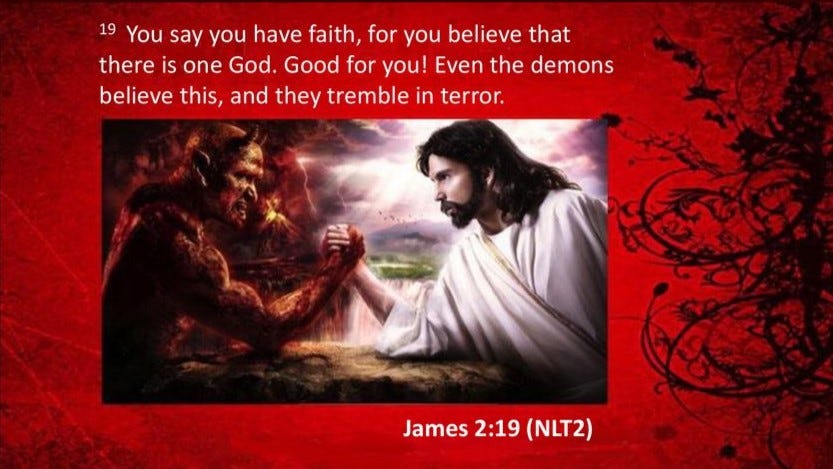I was trying to find a meme I had seen related to today’s first reading and, um…
Reading 1
Rom 4:1-8
Brothers and sisters: What can we say that Abraham found, our ancestor according to the flesh? Indeed, if Abraham was justified on the basis of his works, he has reason to boast; but this was not so in the sight of God. For what does the Scripture say? Abraham believed God, and it was credited to him as righteousness. A worker's wage is credited not as a gift, but as something due. But when one does not work, yet believes in the one who justifies the ungodly, his faith is credited as righteousness. So also David declares the blessedness of the person to whom God credits righteousness apart from works: Blessed are they whose iniquities are forgiven and whose sins are covered. Blessed is the man whose sin the Lord does not record.
The original Greek word rendered as “credited” is ἐλογίσθη. It’s an accounting term (Paul was a businessman) that’s more strictly translated as “made an entry.” Whether it’s a positive (credit) or negative (debit) depends on the context. Thus, Abraham’s faith is a credit, but in the last verse, the Lord does not “ἐλογίσθη” the sin, or record a debit.
Other, less Catholic, translation will translate this word as “reckoned,” as though that were the end of it. But simple belief obviously can’t be enough, as James tells us—
No, it’s not enough, but belief in God is step in the right direction. It goes in the credit column, but it’s not sufficient in itself.
The image of God the Father helps, I think. If a child wants to be picked up, her dad might say, “Say please.” She says, “Pleeeeeeeeeeeeeeeeeease,” and so he picks her up. Did she cause herself to fly into the air? Did she accomplish anything by her own power?
No, she lifted her arms up and received his embrace. That’s what our faith is. God doesn’t need us, we need Him, and He loves us unconditionally.
Responsorial Psalm
Ps 32:1b-2, 5, 11
R. I turn to you, Lord, in time of trouble, and you fill me with the joy of salvation.
Blessed is he whose fault is taken away,
whose sin is covered.
Blessed the man to whom the LORD imputes not guilt,
in whose spirit there is no guile.
R. I turn to you, Lord, in time of trouble, and you fill me with the joy of salvation.
Then I acknowledged my sin to you,
my guilt I covered not.
I said, "I confess my faults to the LORD,"
and you took away the guilt of my sin.
R. I turn to you, Lord, in time of trouble, and you fill me with the joy of salvation.
Be glad in the LORD and rejoice, you just;
exult, all you upright of heart.
R. I turn to you, Lord, in time of trouble, and you fill me with the joy of salvation.
This is one of the Penitential Psalms, but it’s not very sad, is it? This is the way we’re meant to view confession and reconciliation—once it’s done, it’s done. If we don’t cover our guilt (which wouldn’t work anyway), God takes away our guilt.
Alleluia
Ps 33:22
R. Alleluia, alleluia.
May your kindness, O LORD, be upon us;
who have put our hope in you.
R. Alleluia, alleluia.
In the translation on the USCCB website, this appears as “May your mercy, LORD, be upon us.” Which, I think, fits better with our forgiveness theme today.
Gospel
Lk 12:1-7
At that time: So many people were crowding together that they were trampling one another underfoot. Jesus began to speak, first to his disciples, "Beware of the leaven–that is, the hypocrisy–of the Pharisees.
"There is nothing concealed that will not be revealed, nor secret that will not be known. Therefore whatever you have said in the darkness will be heard in the light, and what you have whispered behind closed doors will be proclaimed on the housetops.
“I tell you, my friends, do not be afraid of those who kill the body but after that can do no more. I shall show you whom to fear. Be afraid of the one who after killing has the power to cast into Gehenna; yes, I tell you, be afraid of that one.
“Are not five sparrows sold for two small coins? Yet not one of them has escaped the notice of God. Even the hairs of your head have all been counted. Do not be afraid. You are worth more than many sparrows."
Jesus uses leaven as a metaphor regularly. Much like ἐλογίσθη, it can be good (the Parable of the Yeast)1 or bad (like here). The point is that yeast gets everywhere, mixing in throughout the dough. You have to make sure you’re using the right kind.
This whole passage presents a collection of sayings of Jesus. They center on following Jesus’ mission fearless, assuring us of God’s protection even in times of persecution. Because the thing to be afraid of is not the enemies in this life, but the Enemy in the next. Remember, Satan believes in God just as much as you do—
Faith is just the starting point, followed by hope. But the most important virtue, Jesus tells us, is love. With that, there’s no reason to be afraid.







